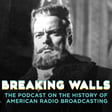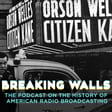Become a Creator today!Start creating today - Share your story with the world!
Start for free
00:00:00
00:00:01

BW - EP156—005: Halloween 1944—The Whistler’s Beloved Fraud
Support Breaking Walls at https://www.patreon.com/thewallbreakers
Despite its west-coast regional status for most of its days. The Whistler had one of radio’s best-known crime-show formats and one of the longest runs. The signature ranks with radio’s greatest, playing perfectly into the host’s “man of mystery” role. Like the Shadow and the Mysterious Traveler, the Whistler was a voice of fate, baiting the guilty with his smiling malevolence.
Originally taking to the air May 16th, 1942 from CBS’s KNX studios in Los Angeles, The show opened with echoing footsteps and a lingering whistle, destined to become one of the all-time haunting melodies. The whistle got louder, then louder, finally blending with the orchestra in a high-pitched sting. When the Whistler spoke he said, “I am the Whistler, and I know many things, for I walk by night. I know many strange tales, many secrets hidden in the hearts of men and women who have stepped into the shadows. Yes, I know the nameless terrors of which they dare not speak.”
The unstated theme that ran the distance was “this could happen to you.” The Whistler told stories of the everyday gone haywire, of common men driven to murder and then being tripped up in a cunning double-twist. These were not mysteries: the identity of the killer was never in doubt, from the first hint that the deed must be done until the moment when the killer trapped himself. The stories were told by the Whistler from the killer’s viewpoint, the narration done in the unusual second-person, present tense. In the earliest days, producer J. Donald Wilson sometimes had the Whistler engage in open dialogue with the characters, the host playing the conscience, arguing with the murderer and goading him to the inevitable doom. The final act was not played out, but was summarized by the Whistler in an epilogue as, like the Shadow, he laughed and sealed the killer’s fate with a few terse lines of plot twist.
One of the first changes made by George Allen when he arrived as director in 1944 was to fully dramatize that closing turnabout. This was far more satisfying. The Whistler remained the great omniscient storyteller of the air, for the Shadow had long since become his own hero, and the Mysterious Traveler never packed quite the same punch. The voice was an unforgettable tenor, the message dripping with grim irony. “It all worked out so perfectly, didn't it, Roger,” he would coo, while listeners waited for the shoe to drop. This would come in “the strange ending to tonight’s story,” the little epilogue when the finger of fate struck, some fatal flaw of character or deficiency in the master plan that was so obvious that everyone had overlooked it.
By October 30th, 1944 Signal Oil was sponsoring the program with the supporting cast being made up of Hollywood’s famous character actors, like Cathy and Elliott Lewis, Joseph Keams. Betty Lou Gerson, Wally Maher, John Brown, Hans Conried, Gerald Mohr, Lurene Tuttle, and Jeanette Nolan. Dorothy Roberts, whistled the notes.
On that night The Whistler took to the air with “The Beloved Fraud.”
![BW - EP110: Christmas Week 1948—The CBS Talent Raids [Rewind] image](https://media.zencastr.com/cdn-cgi/image/width=112,quality=85/image-files/6409d685eee9430023007f69/5e205624-18c8-4767-b707-293dab3d859d.png)
![BW - EP109: Thanksgiving 1948—The Changing Radio Landscape [Rewind] image](https://media.zencastr.com/cdn-cgi/image/width=112,quality=85/image-files/6409d685eee9430023007f69/548f064f-68d2-487d-97ae-fc41d7a09733.png)
![BW - EP108: Halloween 1948—Dewey Vs. Truman [Rewind] image](https://media.zencastr.com/cdn-cgi/image/width=112,quality=85/image-files/6409d685eee9430023007f69/b27134fe-5167-4c32-b010-20dc996efd72.png)
![BW - EP107: Back to School with The Nelsons (1933 - 1954) [Rewind] image](https://media.zencastr.com/cdn-cgi/image/width=112,quality=85/image-files/6409d685eee9430023007f69/43d54063-a494-4a14-9611-0d2750885c61.png)
![BW - EP106: Summer Vacation with Our Miss Brooks (1948 - 1954) [Rewind] image](https://media.zencastr.com/cdn-cgi/image/width=112,quality=85/image-files/6409d685eee9430023007f69/fadac65a-a276-4173-b58b-15ad3e5d8b79.png)
![BW - EP105: Sam Spade Comes to Radio (1946 - 1951) [Rewind] image](https://media.zencastr.com/cdn-cgi/image/width=112,quality=85/image-files/6409d685eee9430023007f69/904e05a8-6f3c-4703-a5b9-f4d100f815b8.png)
![BW - EP104: Orson Welles' Radio Career From Pearl Harbor to the End of Radio’s Peak (1941—1948) [Rewind] image](https://media.zencastr.com/cdn-cgi/image/width=112,quality=85/image-files/6409d685eee9430023007f69/768e9db4-62e3-454a-a926-e9e9473dae9f.png)
![BW - EP103: A Weekend at the Malt Shop with Fibber McGee and Molly (1955) [Rewind] image](https://media.zencastr.com/cdn-cgi/image/width=112,quality=85/image-files/6409d685eee9430023007f69/d6080cf1-0c56-45ff-8ac8-d2938d85f2d7.png)
![BW - EP102: The Return of Johnny Dollar (1955) [Rewind] image](https://media.zencastr.com/cdn-cgi/image/width=112,quality=85/image-files/6409d685eee9430023007f69/b0f343a7-d0c9-4fab-ab11-0523f952fa0c.png)
![BW - EP101: Frontier Gentleman and The Saga of Belle Siddons (1958) [Rewind] image](https://media.zencastr.com/cdn-cgi/image/width=112,quality=85/image-files/6409d685eee9430023007f69/497ef4dd-582c-491b-a387-9609f9174d96.png)
![BW - EP100: The Radio Career of Lucille Ball (1938 - 1952) [Rewind] image](https://media.zencastr.com/cdn-cgi/image/width=112,quality=85/image-files/6409d685eee9430023007f69/f11a5e7d-90a9-41b6-bf74-12d3cf74150e.png)
![BW - EP99: New Year's 1948 On The Air [Rewind] image](https://media.zencastr.com/cdn-cgi/image/width=112,quality=85/image-files/6409d685eee9430023007f69/af13dcda-61f9-4850-9b40-ab82657e594e.png)
![BW - EP98: Christmas Week 1947 with Radio's Biggest Stars [Rewind] image](https://media.zencastr.com/cdn-cgi/image/width=112,quality=85/image-files/6409d685eee9430023007f69/d2ec035a-5a5d-4a6d-b673-6d0ea1a3affb.png)
![BW - EP97: Thanksgiving 1947—The Most Popular Season in Radio History [Rewind] image](https://media.zencastr.com/cdn-cgi/image/width=112,quality=85/image-files/6409d685eee9430023007f69/789295b2-501e-4d61-a277-b0d0bc11aab3.png)
![BW - EP96: Halloween on the Air (1943 - 1953) [Rewind] image](https://media.zencastr.com/cdn-cgi/image/width=112,quality=85/image-files/6409d685eee9430023007f69/8dbfefb4-538a-4c92-a4f5-55b52b8c50fb.png)

![BW - EP95: Radio And The Classroom (1939 - 1965) [Rewind] image](https://media.zencastr.com/cdn-cgi/image/width=112,quality=85/image-files/6409d685eee9430023007f69/a950ce49-eb07-49e5-853c-4d7774f88d6a.png)
![BW - EP93: Radio And The New York City Subway (1941 - 1975) [Rewind] image](https://media.zencastr.com/cdn-cgi/image/width=112,quality=85/image-files/6409d685eee9430023007f69/d02ce67c-1846-4b7f-a9bb-fb635073bffe.png)
